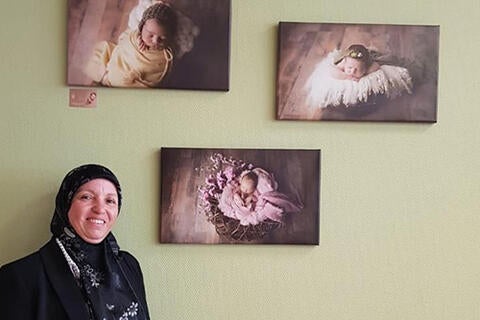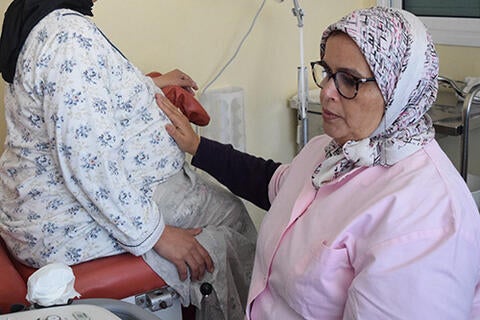RABAT, Morocco – Madame Najat Baloui, a midwife in Casablanca, vividly remembers a childbirth that went horribly wrong. “A woman was delivering vaginally,” Ms. Baloui recalled. “After several hours, the labour stopped suddenly.”
Realizing the woman was at risk of uterine rupture, Ms. Baloui rushed her patient to an operating room for an emergency Caesarean section. “During the intervention, the doctor confirmed that the uterus was starting to tear,” Ms. Baloui recounted.
The woman survived. So did her baby.
But 20 years ago, that situation might have ended very differently.
Maternal death rates in Morocco were significantly higher in 2000, with 188 women dying out of every 100,000 live births. By 2017, maternal deaths fallen by 63 per cent, according to the latest United Nations figures. Morocco’s national survey on population and family health shows an even greater improvement – a 68 per cent decline in maternal mortality between 1997 and 2018.
Midwives have played a key role in mothers’ survival: As more professional midwives entered the workforce, births became safer. Today, nearly 89 per cent of births in Morocco are assisted by professional midwives.
Midwives at the heart of reproductive health care

Naima Rouani was inspired to become a midwife after her own positive experience receiving care from a midwife. "Her calm and availability at night to meet my needs and my questions led me to choose this profession that changed my life." © UNFPA
And midwives do much more than assist women during childbirth.
“Midwifery care includes preventive measures, screening for abnormal conditions in mothers and children, and seeking medical assistance when needed,” explained Naima Rouani, a midwife of more than 20 years who is now a midwifery teacher. “It plays an important role in health education, not only for women, but also for the whole family.”
A midwife also “provides family planning, vaccination, health education and management of menopause and beyond,” said Khadija Bahzad, a long-time midwife in Marrakech.
And midwives provide confidential, nonjudgmental care to marginalized women and girls.
“In my journey, I have been the most impacted by the single mothers I assisted during their deliveries,” Ms. Bahzad told UNFPA. “Often rejected by their families, their pregnancies were not monitored [by health-care professionals]. They came alone and sometimes did not even have clothes for their babies. I particularly felt this responsibility to provide care adapted to the needs of these women, in order to give them confidence and ensure their well-being and that of their newborns.”
Yet around the world, midwives and midwifery services are under-resourced. “The role of the midwife is often overlooked,” Ms. Bahzad said.
Today, it is estimated that almost three quarters of maternal deaths in Morocco are preventable; more than two thirds of these deaths occur in rural areas, where midwives act as outreach workers.
With greater support, resources and training, midwives would be able to could help to avert a majority of these deaths.
“Midwifery is an art”
UNFPA began supporting Morocco’s midwifery programmes around 2000, partnering with the health ministry and local midwifery groups including the Moroccan Association of Midwives and the National Association of Midwives.
These partnerships are ongoing: Ms. Baloui, Ms. Rouani and Ms. Bahzad all help to facilitate UNFPA-supported midwifery education and training programmes. Over 100 Moroccan midwives were reached with these education sessions in 2019, and a UNFPA-supported distance-learning course run from Rabat additionally reached midwifery students and educators from five Arab and African countries.

“The midwifery profession has forged my patience and wisdom," says Najat Baloui. © UNFPA
These lessons cover emergency obstetric care, reproductive health services, human rights, humanitarian emergencies, ethics, communications skills and other critical topics.
The midwifery trainers are hopeful their efforts will further improve the health of women and their babies. “I dream of the day when we will no longer
hear about maternal and newborn deaths in our country,” Ms. Bahzad told UNFPA.
The World Health Organization has designated 2020 as the International Year of the Nurse and the Midwife, acknowledging the critical importance of these professions.
But for midwives like Ms. Baloui, the greatest reward is the work itself.
“Each time I [help a woman] give birth, I feel honoured to be able to witness the first moments of a human being’s life,” she said. She added, “I, personally, believe that midwifery is an art.”

